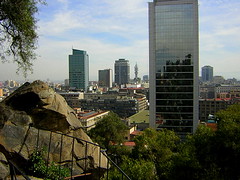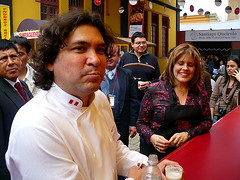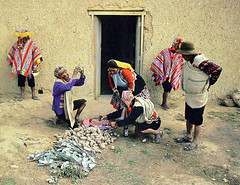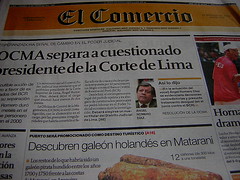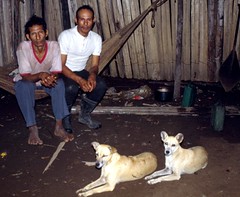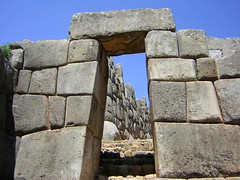Novalima in London [Featured]
I was sent this article written by Paul Haste that anyone in London ought to read. You can see Novalima at the Cargo club, in EC2.
An infectiously danceable mix-up of old slave songs, salsa and dub
IT’S impossible not to dance to Novalima’s music.
Their mesmerising Afro-Peruvian rhythms based on 400-year-old slave songs mixed with Latin salsa and Caribbean dub is perfect music for this city of immigrants.
Cramming into the Cargo club beneath the rail arches where an old east London garment workers’ district meets the glittering steel and glass skyscrapers of the City, the nine musicians who make up Novalima bring the sounds of Peru’s Pacific shore to Britain.
More laid-back than the harder-edged sounds of Afro-Colombian music, Novalima’s hypnotic, soulful beats reflect their country’s calmer desert coasts and big blue skies.
After opening with a “marinera” song – the music to Peru’s national dance, but to which percussionist Mangue Vásquez adds traditional Afro-Peruvian cries – the sensual moves of striking lead singer Milagros Guerrero then capture all attention.
“Negro será presidente,” she sings – a black man will be president – beginning the pulsating Libertá, its strong lyrics celebrating freedom from slavery while continuing the unfinished struggle for civil rights and equality.
“Negro canta la misa, negro será abogado, que buenos tiempos, los tiempos de libertá” – a black man will lead the church, a black man will be a lawyer, how joyful these times, the times of freedom.
Not dancing is not an option. Should Novalima’s mix of funk, soul and dub not entice you to get up on the floor, the Latin Americans packing every concert won’t let you resist.
The music of this band of four white descendants of the Spanish and five black descendants of slaves seems to reflect the two worlds of this city’s migrants.
The touch of sadness, but the celebration of life and happiness – a mix of work and struggle with the hopes and promise of a better future – are expressed in passionate songs such as Africa Landó, with its slow tempo and melancholy lyrics, or Kumaná with its raunchy, raucous chants that everyone joins in.
As well as bringing to London the rich sounds of slave songs from as far back as the 1500s, Novalima bring the traditional musical instruments that those captive workers used, too.
Marcos Mosquera and Juan Medrano Cotito add percussion by banging on a “cajita” – a musical box that they hit while opening and closing it – while Mangue holds out a “quijada,” which is a horse’s jawbone complete with a full set of big teeth, to thump with his fist and make a quivering, clattering kind of sound.
Coba Coba! – hit it! – is the entirely appropriate title of Novalima’s latest CD, most of whose songs they showcased during the set which the Cargo crowd did not want to let them finish.
Tags: african, black, london, musica negra, slavery



